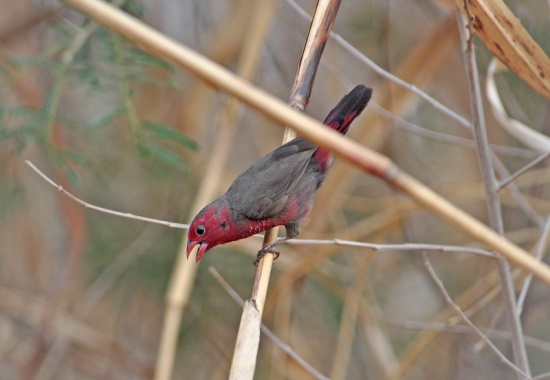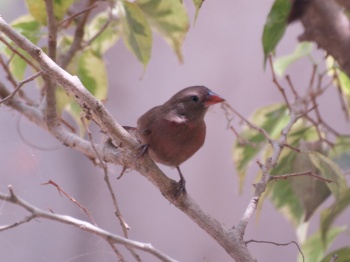(Clearer image added. References updated) |
(Picture of juvenile. References updated) |
||
| Line 1: | Line 1: | ||
| + | [[Image:Firefinch bar breasted - gambella 3cc .jpg|thumb|550px|right|Photo by {{user|volker+sthamer|volker sthamer}}<br />Bonga near Gambella, Ethiopia, March 2012]] | ||
;[[:Category:Lagonosticta|Lagonosticta]] rufopicta | ;[[:Category:Lagonosticta|Lagonosticta]] rufopicta | ||
| − | |||
==Identification== | ==Identification== | ||
| − | + | 9–10 cm (3½-4 in)<br /> | |
| − | *Pink forehead, lores and sides of head | + | *Pink forehead, [[Topography#Heads|lores]] and sides of head |
*Grey brown crown and neck | *Grey brown crown and neck | ||
*Brown back and wings | *Brown back and wings | ||
| − | *Yellow brown lower belly and under tail coverts | + | *Yellow brown lower belly and under tail [[Topography#General Anatomy|coverts]] |
*Pink upper belly with dark rimmed white spots | *Pink upper belly with dark rimmed white spots | ||
*Red upper tail coverts<br /> | *Red upper tail coverts<br /> | ||
Female similar but duller | Female similar but duller | ||
| + | [[Image:Bar breasted Firefinch Juvenile 1.JPG|thumb|350px|right|Juvenile<br />Photo by {{user|whiteheadedvulture|whiteheadedvulture}}<br />Accra, [[Ghana]], February 2016]] | ||
==Distribution== | ==Distribution== | ||
[[Africa]]:<br /> | [[Africa]]:<br /> | ||
| Line 27: | Line 28: | ||
Broad-leaved grass is used to build the nest, which is lined with feathers and they are placed in dense grass or bushes. The four eggs are cared for by both parents. | Broad-leaved grass is used to build the nest, which is lined with feathers and they are placed in dense grass or bushes. The four eggs are cared for by both parents. | ||
====Diet==== | ====Diet==== | ||
| − | The diet | + | The diet consists of small seeds, especially of grasses, and some insects. |
==References== | ==References== | ||
| − | #{{Ref- | + | #{{Ref-Clements6thAug15}}#Avibase |
#The Finch Handbook, Christa Koepff, April Romagnano | #The Finch Handbook, Christa Koepff, April Romagnano | ||
| + | #Handbook of the Birds of the World Alive (retrieved February 2016) | ||
{{ref}} | {{ref}} | ||
==External Links== | ==External Links== | ||
Revision as of 23:56, 17 February 2016
- Lagonosticta rufopicta
Identification
9–10 cm (3½-4 in)
- Pink forehead, lores and sides of head
- Grey brown crown and neck
- Brown back and wings
- Yellow brown lower belly and under tail coverts
- Pink upper belly with dark rimmed white spots
- Red upper tail coverts
Female similar but duller
Distribution
Africa:
Western Africa: Senegambia, Senegal, The Gambia, Guinea-Bissau, Guinea, Mali, Sierra Leone, Liberia, Ivory Coast, Burkina Faso, Ghana, Togo, Benin, Nigeria, Chad, Cameroon, Central African Republic, Equatorial Guinea, Democratic Republic of Congo
Eastern Africa: Sudan, Ethiopia, Kenya, Uganda, Rwanda
Taxonomy
Subspecies
There are 2 subspecies[1]:
- L. r. rufopicta:
- L. r. lateritia:
Habitat
Tall grass and brush in savanna near river banks.
Behaviour
Breeding
Broad-leaved grass is used to build the nest, which is lined with feathers and they are placed in dense grass or bushes. The four eggs are cared for by both parents.
Diet
The diet consists of small seeds, especially of grasses, and some insects.
References
- Clements, J. F., T. S. Schulenberg, M. J. Iliff, D. Roberson, T. A. Fredericks, B. L. Sullivan, and C. L. Wood. 2015. The eBird/Clements checklist of birds of the world: v2015, with updates to August 2015. Downloaded from http://www.birds.cornell.edu/clementschecklist/download/
- Avibase
- The Finch Handbook, Christa Koepff, April Romagnano
- Handbook of the Birds of the World Alive (retrieved February 2016)
Recommended Citation
- BirdForum Opus contributors. (2024) Bar-breasted Firefinch. In: BirdForum, the forum for wild birds and birding. Retrieved 13 May 2024 from https://www.birdforum.net/opus/Bar-breasted_Firefinch





